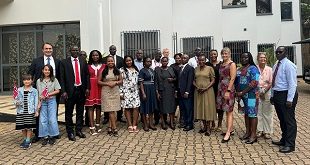
Kampala, Uganda | THE INDEPENDENT | 15.9 million Ugandans could have been infected with COVID-19, this is according to a study published by the World Health Organization-WHO.
According to the findings of the study that were presented on Thursday during a weekly meeting, the number of COVID-19 cases that were reported on the continent did not capture the actual numbers of infected persons. Initially, the Ministry of Health had confirmed that 163,954 tested positive for Covid-19.
The study whose findings are based on 151 seroprevalence studies carried out on the continent between January 2020 and December 2021 shows that the COVID- infections were 97 times more than the reported cases.
For instance, as of April 6, 2022, there were 11.5 million confirmed cases and more than 252,000 deaths reported on the continent. If the findings of the study are accurate, as many as 1.1 billion Africans could have been infected with COVID-19. This translates to 65 percent of the African population being infected with COVID-19.
The results show that exposure to SARS-CoV-2 skyrocketed from 3 percent in June of 2020 to 65 percent by September 2021. This equates to 800 million infections compared with 8.2 million cases reported at that time. The study showed that exposure to the virus rose sharply following the emergence of the Beta and the Delta variants.
The WHO Africa Region Director, Dr. Matshidiso Moeti says the findings are not surprising since under-counting has occurred worldwide. She however adds that in the case of Africa, it was expected due to the high number of infected cases with no symptoms.
“This analysis shows that current reported COVID-19 confirmed cases are only a fraction of the actual number of infections on the continent. This under-counting is occurring worldwide and it’s no surprise that the numbers are particularly large in Africa where there are so many cases with no symptoms,” she said.
Globally seroprevalence studies have found a significant under-counting of cases occurring across the globe with 45.2% of the world’s population estimated to have been infected with the virus by September 2021.
Scientists have attributed under-reporting to limited testing taking place in different parts of the world. In countries like Uganda, testing for the disease was mainly focused on travelers or persons exhibiting symptoms. As a result, few cases were reported.
Dr. Misaki Wayengera, the head of the COVID-19 Ministerial Scientific Committee says the county could not afford to test everyone.
“The cost of testing for COVID-19 is high and as such, the country could not afford to test all Ugandans. We decided to focus on travelers because their chances of interacting with infected persons were high and as such, the probability of them transmitting it was high,” he said.
According to Dr. Moeti, compared to other parts of the world, 67 percent of all the infected persons on the continent didn’t exhibit any of the symptoms of COVID-19 like headache, dry cough, flu, joint pain, and loss of smell and taste.
In addition to being asymptomatic, the study finds that the continent had milder COVID-19 cases compared with other parts of the world because there is a comparatively smaller proportion of people with risk factors such as diabetes, hypertension, and other chronic diseases that are associated with more severe cases and deaths. Africa’s youthful population is also a protective factor.
However, Dr. Moeti cautions against new emerging variants. She says seroprevalence surveys show that the virus continues to circulate in the population.
“Despite Africa’s declining infections and high exposure to the virus, we cannot declare victory yet against COVID-19. The seroprevalence analysis shows just how much the virus continues to circulate, particularly with new highly transmissible variants. The risks of more lethal variants emerging which overwhelm immunity gained from past infections cannot be brushed aside. Vaccination remains a key weapon in the fight against COVID-19,” she said.
*****
URN
 The Independent Uganda: You get the Truth we Pay the Price
The Independent Uganda: You get the Truth we Pay the Price



Talk of herd immunity! Can the World Health Organisation organise safest reliable Systems to make testing kits affordable to humanity at beckon call? Thank you.